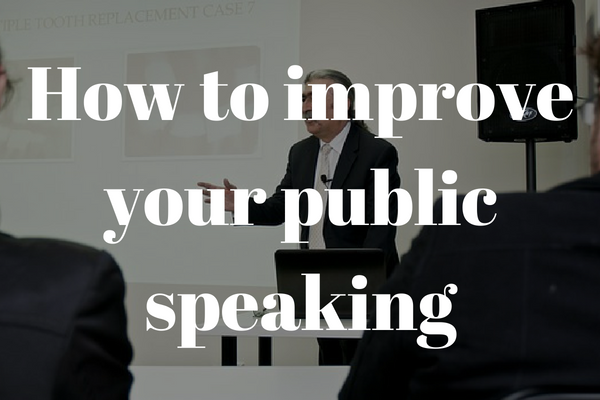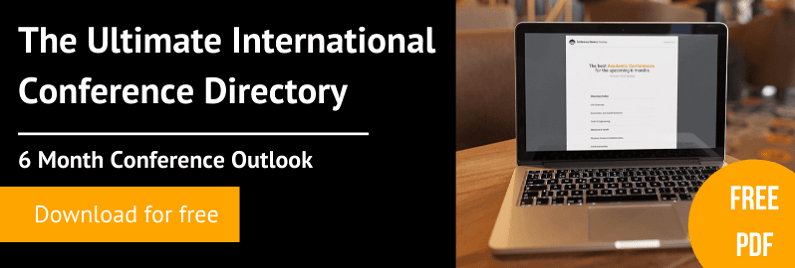
How To Improve Your Public Speaking
Read a summary using the INOMICS AI tool
Public speaking can be scary, but there are techniques that you can try out which will make it easier and improve your talks. For a look at all upcoming conferences where you can put these strategies into action check out our conference listings.
Download the Conference Monkey Directory - 6 Month Conference List

- Practice, practice, practice
- Getting comfortable in different spaces
- Tailoring your material
- Projecting, enunciating
- Visuals
- Notes
- Outlines
- Equipment
- Questions
- Relax!
Practice, practice, practice
When you're nervous or inexperienced, public speaking can seem like a daunting prospect. The best way to get comfortable with it is to practise as much as you possibly can. Volunteer to present in classes and workshops, practise your talk on your friends, and even practise giving your talk out loud on your own. The more times you do this, the less intimidating it will be to give a talk at a conference or other major event.
Get used to different rooms and different sized audiences
One challenge that you'll need to adjust to is the variation in event spaces and audiences that you'll need to work with. In a smaller room with a smaller audience, you can speak in your natural voice and you will be heard fine. In a larger room, however, especially in a lecture hall, you will need to use a microphone. Try to practise with the microphone so you know how far away to hold it for the best sound.
Tailor your material to the knowledge level of your audience
For your audience to get the most from your talk, you should try to pitch it at an appropriate level of knowledge. This could involve giving brief explanations of basic concepts for a less knowledgeable audience or skipping over to more detailed information for a more advanced audience. You can always ask about the backgrounds of the audience before you begin your talk to get an idea of the level you should pitch at.
Project and enunciate
Often when people get nervous, they talk too fast or mumble. In order for your audience to understand your talk, they first have to be able to hear you properly. So get in practice at speaking more slowly than you think you should. Also, make sure that you are enunciating clearly and that you are projecting your voice well, which is particularly important in a room without a microphone.
Use visuals but don't rely on them
It's very common in situations like conferences for the speaker to use visual aids such as slides. These visual aids can certainly be helpful for conveying information such as data or results from your research. However, you should avoid being too dependent on your slides. Don't look at your slides all the time – look at your audience instead – and don't put too much information on the slides or your audience will read instead of listening to you.
Don't read directly from notes
One terrible habit that some speakers have is reading directly from their notes. You should definitely not write out your entire talk and then read it aloud, as this will sound stilted and flat. Instead, plan what subjects you will talk about but let your delivery be natural and flowing.
Do have an outline with you just in case
That said, if you rely on your notes or slides to keep your talk on track then you don't need to feel completely lost. Make a brief outline of the key points that you want to cover in your talk and keep it in front of you so you can refer to it if you need to.
Check the equipment before your speech
There are few problems more stressful than standing up to give a talk and then realising that the microphone or laptop doesn't work. Then you have to try and fix it with an entire audience staring at you, and your talk will feel uncomfortable and panicked. To avoid this problem, make sure that you check all of your equipment before your talk – which could include the laptop, projector, speakers, laser pointer, or flash drive.
Be prepared to answer questions
After your talk, it is customary to answer questions from the audience. Many people find this intimidating but you needn't panic. Remember that if you don't know something, you can always say so – and you can always offer to talk with a questioner later after the talk if the discussion is becoming very in depth.
Try to relax – think of it as a conversation
Public speaking can actually be good fun and very rewarding once you are used it too. Try to think of it less as a test or assessment, and more of a conversation that you are having with the audience. Explain topics in the same way that you would if you were talking to one person. This will make your talks more personable and your audience more engaged.
Download the Conference Monkey Directory - 6 Month Conference List
Top Blog Posts to Read:
What's the difference between a conference, a seminar, a workshop and a symposium?
8 Benefits of Attending Conferences
What Should Women Wear to Academic Conferences?
What Should Men Wear To Academic Conferences?
A Guide to Asking Good Questions at Conferences
How to Get Accepted to an Academic Conference
-
- Conference
- (Hybrid)
- Posted 4 months ago
Call for Papers - In_equality Conference 2026
Between 15 Apr and 17 Apr in Konstanz, Germany
-
- Conference
- (Hybrid)
- Posted 2 months ago
Artificial intelligence in economic narratives, forecasting, and risk assessment
Between 23 Mar and 24 Mar in Frankfurt am Main, Germany
-
- Workshop
- Posted 2 months ago
CESifo Junior Workshop on Energy and Climate Economics 2026
Between 23 Apr and 23 Apr in Munich, Germany












